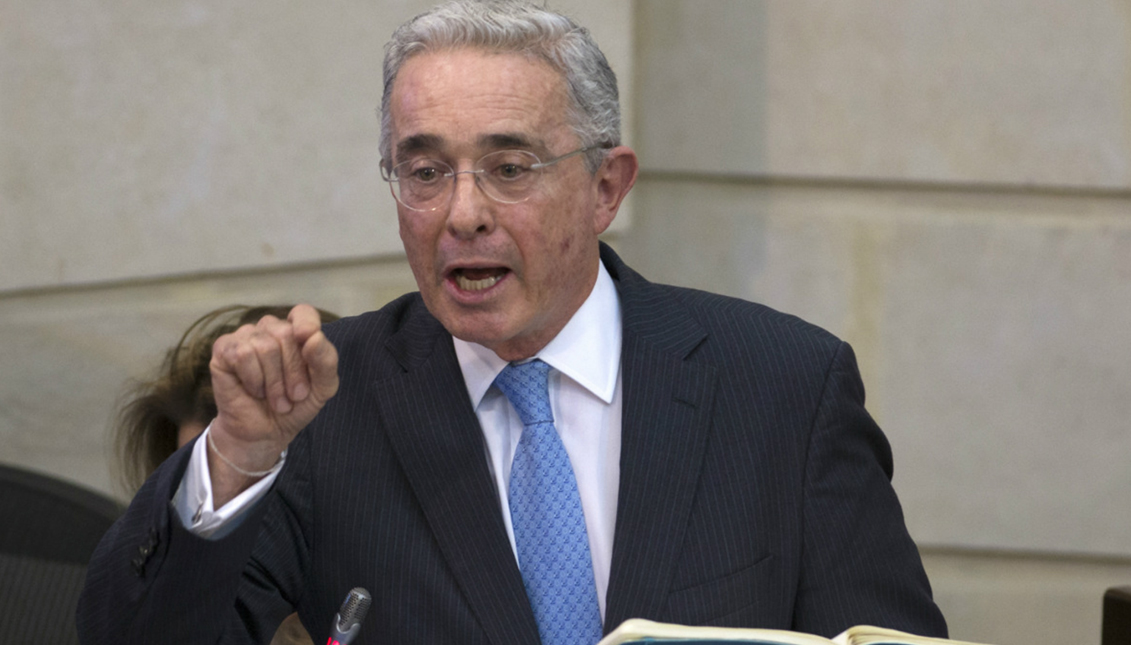
Former Colombian President Álvaro Uribe resigns his Senate seat
After being placed under house arrest earlier this month for potentially engaging in witness tampering, Uribe plans to not return to the Senate.
Álvaro Uribe Vélez, president of Colombia from 2002 to 2010, was regarded as one of the country’s most influential leaders, but his reputation may be shattered after resigning from his Senate seat while under house arrest for allegedly engaging in witness tampering.
The 68-year old’s time in Colombian politics has been divisive to say the least.
Political opponents of the conservative leader have continuously accused him of having direct ties to right-wing paramilitary groups that committed several atrocities and human rights violations.
A controversy that still haunts Uribe is the 1997 El Aro Massacre. He was the governor of Antioquia when a town in his jurisdiction named El Aro was taken over by 100 members of a paramilitary organization for three days.
The group used the excuse of looking for hostages held by Revolutionary Armed Forces of Colombia (FARC), a left-wing guerilla group, to brutally execute 15 locals, steal livestock and burn the town to displace the population.
Victims say they spotted a helicopter from the governor’s office flying overhead while their town was being destroyed.
Uribe’s adversaries also hold him responsible for the “false positives” scandal.
When he was president, over 10,000 innocent civilians were murdered by the Colombian Army and they labeled the victims as members of leftist insurgency to inflate their statistics to receive increasing U.S. military aid.
The former president’s hand-picked successor, Juan Mauel Santos, was the Minister of National Defense from 2006 to 2009, during the height of the extrajudicial killings.
Uribe has such a strong resentment for FARC guerrillas that he stopped supporting Santos when he initiated peace talks with them in 2012.
Santos was later awarded the 2016 Nobel Peace Prize for reaching an agreement with the insurgency that formally ended the 52-year conflict.
Supporters of Uribe view him as someone who saved the country from collapse because as he squashed the strength of the FARC, security increased, which brought more direct foreign investment.
In 2009, He was recognized for his efforts to end violence and silence political dissent in Colombia by president George W. Bush when he received the Presidential Medal of Freedom, America’s highest civilian honor.
There is little value in holding an award for peace that was given by a U.S. president that lied to the American public to generate support for the Iraq War only to add to the American ritual of engaging in senseless regime change.
He was unsuccessful in pushing an amendment to the constitution that would allow him to seek a third term. Many thought he would have won since he left office with a 75% approval rating.
The former president technically should not have even been able to serve for a second term.
From 1910 to 2005, Colombia had only allowed their leaders to serve one four-year term, but his attempts to change the constitution were successful.
This came at a cost, as a former member of the House of Representatives, Yidis Medina, admitted to accepting bribes to vote in favor of the amendment that allowed Uribe to serve a second term.
This became known as the Yidispolítica Scandal.
RELATED CONTENT
Former president Uribe won a seat in the Senate in 2014 under the banner of his newly-formed Center Democratic Party.
In the same year, leftist senator, Iván Cepeda, accused Uribe of being responsible for the emergence of paramilitary groups that went after thousands affiliated with left-wing guerilla groups.
Cepeda used testimonies from former paramilitary members to affirm his claims and when the case got to the Supreme Court, Uribe claimed the leftist senator manipulated their stories.
There was a deeper investigation as years passed and the recent court ruling suggests there is reason to believe the former president was actually the one engaging in witness tampering and he was placed under house arrest on Aug. 4 as he was seen as a potential flight risk.
He announced that he would be resigning from his Senate seat in a video released on Tuesday where he read the same letter he gave to the Senate.
Renuncia al Senado pic.twitter.com/2tWHwd1pz2
— Álvaro Uribe Vélez (@AlvaroUribeVel) August 18, 2020
The now-former senator claimed he was forced down this road because his house arrest annulled any expectation for him to return to the Senate and his suspicion of several irregularities he noticed in his legal process.
“Detained by inferences without direct evidence. Without receiving several statements with compulsive witnesses in favor. Without my lawyers being able to cross-examine. With the magistrate warning of possible self-incrimination or self-accusation to help the other side hide messages, evidence. All of which nullifies any expectation of being able to return to the senate,” he said.
This is unprecedented for Colombia as the country has never detained a former president, if convicted he could face eight years in prison.
The former president submitted his letter of resignation on Tuesday and the Senate voted to accept his decision the same day. The final count showed 82 legislators were in favor and 12 were against it.
Uribe has been a longtime political mentor to current president Iván Duque Márquez.After the news broke that the former head of state had been placed under house arrest, Duque publicly addressed the country to voice support for him.
Once the Senate had accepted Uribe’s resignation letter, Duque took to Twitter to say he believes the chamber is losing a great legislator.
“I had the great honor of working with Álvaro Uribe Vélez in the Senate. I am a witness to his love for Colombia, his dedication to the most vulnerable and his commitment to building a better country. With his resignation, Congress loses one of its best legislators, but his legacy will be indelible,” President Duque wrote.
Tuve el gran honor de trabajar con @AlvaroUribeVel en el Senado. Soy testigo de su amor por Colombia, su entrega por los más vulnerables y su compromiso por construir un mejor país. Con su renuncia pierde el Congreso uno de los mejores legisladores, pero su legado será imborrable
— Iván Duque (@IvanDuque) August 18, 2020










LEAVE A COMMENT: